Napoleon Zaglis left his life in Athens and his job in a multinational company to maintain a five-generation tradition in his beautiful village.
His ‘kafeneion’ (traditional Greek coffee house) is one of the oldest in Greece. This is the fascinating story of Napoleon and his kafeneion.

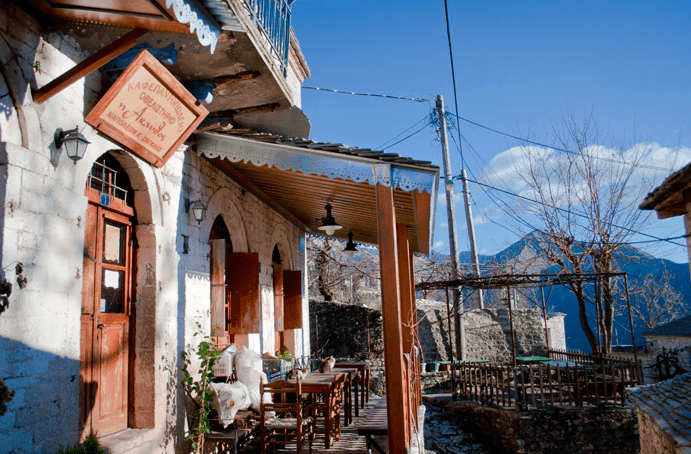
Kalarites in Tzoumerka- the Ioannina region of Epirus- is a truly picturesque village. Especially during winter, it looks like a forgotten, magical spot on this planet. It stands as a monument of what life once was, far away from the noise and modern distractions. The great grandfather of Napoleon began the tradition of the coffee house 174 years ago. Nothing has changed since then. The coffee house remains the same, something unusual for a country, which tends to sacrifice such ‘local monuments’, places and businesses of local and traditional importance, only to transform them into modern impersonal coffee shops.
The inside of the coffee house seems like it has just popped out of a movie scene. Food is absolutely delicious and Napoleon won’t let you order more than you need. Moreover, people often dance and celebrate for no reason, reminiscing about much simpler times. In fact, this is what makes the place unique- its people!
Locals use to enjoy their ‘tsipouro’ while gazing at the endless ‘white’ view of the snowy mountains. Mrs Monica cooks in the kitchen and Napoleon, the most wonderful storyteller, is a man who makes strong life choices. And he defends them. Oh… And when he sings traditional songs… the earth is shaking!
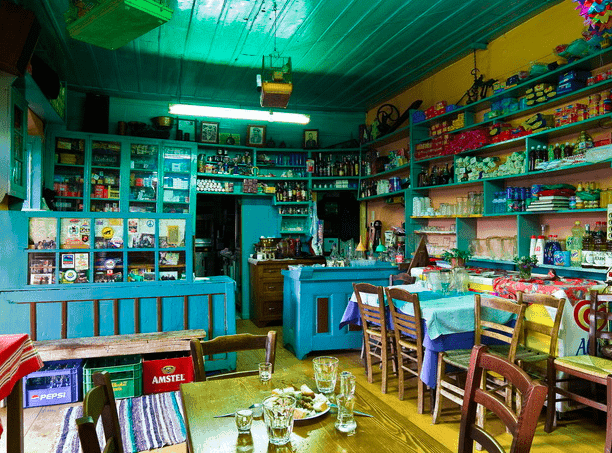
The story of the kafeneion
“The kafeneion opened in 1840 by my great-great-grandfather’ says Napoleon. “It has continuously been open since then and only a few changes have been made. In 1860 my great grandfather got in charge. He was a man of labour, undertaking multiple jobs. He owned and rented cattle and he also had a small boat, which he used in order to travel and sell leather.
Later on, he decided to expand his production and he sent my grandfather to Trieste so that he learnt the art of shoemaking. Pirates stole his boat. One of his 16 children fell in love with a beautiful but poor girl and my grandfather would only approve a girl with a dowry. So, his son stole money from his father and presented it to be from his future father in law. Nevertheless, the father in law took advantage of this money, he never returned it and when my grandfather realised what has happened, everything changed.
His children have split apart and he was forced to return to the village so that he would work on the kafeneion. None of his brothers had stayed there. My grandfather had only learned the art of shoemaking and he created the space ‘Stereotis’ where the kitchen is now. He kept the kafeneion and he also started selling fruits and vegetables”.
The shoemaking
“Back then everyone was wearing ‘tsarouhia’ (a type of shoe that is known as a part of the traditional Greek uniform) and he really couldn’t make any money. So, he trained his children in order for them to leave the village and find a job elsewhere. I have seen an advertisement in a 1925 magazine of Tzoumerka ‘The shoe store of Dimitrios Zaglis- Cheap, honest and solid- try it!’
He named one part of the place ‘honesty’ and one ‘solidity’. The kafeneion was also opened during the Occupation and many families hid their valuables there, but also wheat and corn. My father died in 1992 and my mother kept it until 1995. The thought of abandoning it was making us sad, as this place is connected to the family generation.
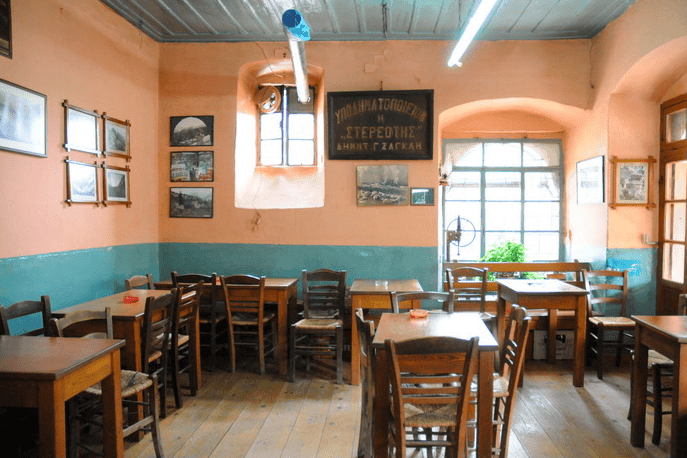
What about the name, ‘Napoleon’? Was it always among the family?
“Not really” highlights Napoleon. “My great-great-grandfather was named Spiros, my great grandfather Dimitris and my father Kostas. My name was meant to be Grigoris, after my mother’s father, but my godfather wanted something impressive, so he named me Napoleon.
Back then, the tradition was the parents not attending the christening. The name would be announced by little kids and the parents would give them money or sweets. Nevertheless, when my father heard my name, he was furious, as he thought that ‘Napoleon’ was a gypsy name”.
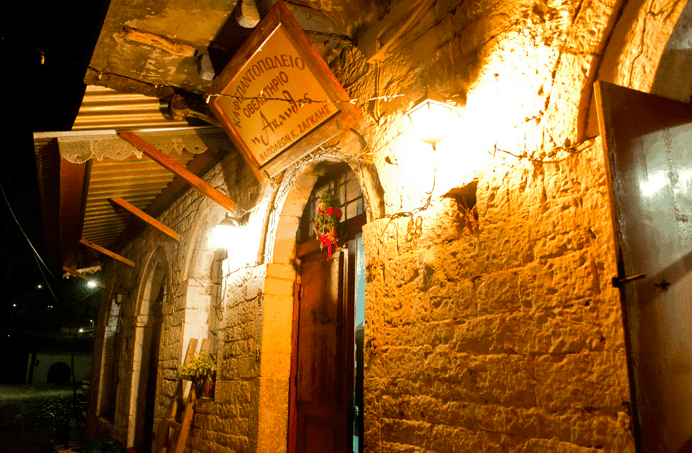
Napoleon decided to return to Kalarites and continue the family business
“I took the decision overnight! And you will laugh if you learn how. My wife and I were working for Unilever for 25 years.
Everyone there knew that there was a part of me that always wanted to move back to the village. Every day I was saying ‘I am leaving tomorrow. One day, my child’s school organised parents gathering.
It was crazy and loud! This exact day, when we came back home, I told my wife ‘it’s now or never. My son had just started school, so it was going to be easy for him to leave Athens at that time. The next day I announced it and everyone was saying ‘think about it again.
But the decision had been made. I stayed in Athens for 25 years. When we returned to the village, we also made a traditional stone guesthouse, which functions all year long.
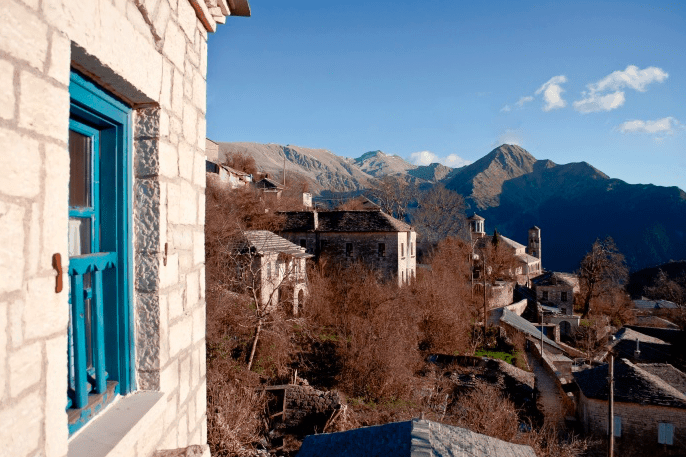 The advantages and disadvantages of living in a small village
The advantages and disadvantages of living in a small village
“Living here has its difficulties, of course. But on the other hand, living within nature and enjoying the calmness…It’s an amazing feeling,” says Napoleon. “The way of life is totally different from the one in Athens.
I have my guesthouse the Kafeneion my animals and I feel happy. My life here is simple. We do have, of course, our dancing nights, which happen spontaneously”.
The Greek crisis and Tzoumerka
Napoleon says that the economic crisis has touched everyone, even this village. “It’s not possible not to feel all these that occur right next to us. Speaking about the village, we have cut the prices on food and the guesthouse.
I do believe that Greeks had this mentality of ‘wasting’. They were coming here and ordering so much food! When I was telling them that this is too much, they were laughing and saying that it was ok. Now, everyone is more careful. You have to be.”
So, maybe you should visit Kalarites and Napoleon during your next getaway?!

Thanks for posting
Thanks for sharing 🙂 A nice read.
My father in law's name was Napoleon. He just passed away February 18, 2017. He also got his name from a Kretan professor who was asked to be godfather. He named boys either Alexander or Napoleon. I named my son after him. A Kretan tradition of naming the first child of each sex after the paternal grandparent then the maternal grandparents...